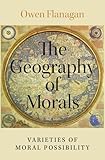The geography of morals : varieties of moral possibility / Owen Flanagan.
Material type: TextPublisher: New York, NY : Oxford University Press, [2017]Description: x, 362 pages ; 25 cmContent type: text Media type: unmediated Carrier type: volumeISBN: 9780190212155; 0190212152Subject(s): Ethics | Psychology and philosophy | Ethics | Psychology and philosophy | Ethik | Philosophische PsychologieDDC classification: 170.9 LOC classification: BJ45 | .F529 2017
TextPublisher: New York, NY : Oxford University Press, [2017]Description: x, 362 pages ; 25 cmContent type: text Media type: unmediated Carrier type: volumeISBN: 9780190212155; 0190212152Subject(s): Ethics | Psychology and philosophy | Ethics | Psychology and philosophy | Ethik | Philosophische PsychologieDDC classification: 170.9 LOC classification: BJ45 | .F529 2017| Item type | Current library | Call number | Copy number | Status | Notes | Date due | Barcode |
|---|---|---|---|---|---|---|---|
 Books
Books
|
Female Library | BJ45 .F529 2017 (Browse shelf (Opens below)) | 1 | Available | STACKS | 51952000237860 | |
 Books
Books
|
Main Library | BJ45 .F529 2017 (Browse shelf (Opens below)) | 1 | Available | STACKS | 51952000237853 |
Browsing Main Library shelves Close shelf browser

|

|

|

|

|

|

|
||
| BJ1725 .S83 2007 Straight talk about professional ethics / | BJ1725.R68 2003 Ethics for the professions / | BJ43 .T47 1999 Critical reasoning in ethics : a practical introduction / | BJ45 .F529 2017 The geography of morals : varieties of moral possibility / | BJ52 .K43 2016 Ethical life : its natural and social histories / | BJ52.5 .T54 2015 From field to fork : food ethics for everyone / | BJ1291.R37 2019 حتى لا تذبل قيمنا |
Includes bibliographical references (pages 329-349) and index.
Variations -- On being imprisoned by one's upbringing -- Moral psychologies and moral ecologies -- Bibliographical essay -- First nature -- Classical Chinese sprouts -- Modern moral psychology -- Beyond moral modularity -- Destructive emotions -- Bibliographic essay -- Collisions -- When values collide -- Moral geographies of anger -- Weird anger -- For love's and justice's sake -- Bibliographical essay -- Anthropologies -- Self-variations: philosophical archaeologies -- The content of character.
"We live in multicultural, cosmopolitan worlds. These worlds are distinctive moral ecologies in which people enact and embody different lived philosophies and conceive of mind, morals, and the meaning of life differently from the typical WEIRD -- Western, Educated, Industrialized, Rich, Democratic -- person. This is not a predicament; it is an opportunity. Many think that cross cultural understanding is useful for developing a modus vivendi where people from different worlds are not at each other's throats and tolerate each other. Flanagan presses the much more exciting possibility that cross-cultural philosophy provides opportunities for exploring the varieties of moral possibility, learning from other traditions, and for self, social, and political improvement. There are ways of worldmaking in other living traditions -- Confucian, Daoist, Buddhist, Hindu, Jain, Muslim, Amerindian, and African -- that citizens in Western countries can benefit from. Cross-cultural learning is protection against what Alasdair MacIntyre refers to as being 'imprisoned by one's upbringing.' Flanagan takes up perennial topics of whether there is anything to the idea of a common human nature, psychobiological sources of human morality, the nature of the self, the role of moral excellence in a good human life, and whether and how empirical inquiry into morality can contribute to normative ethics. The Geography of Morals exemplifies how one can respectfully conceive of multiculturalism and global interaction as providing not only opportunities for business and commerce, but also opportunities for socio-moral and political improvement on all sides. This is a book that aims to change how normative ethics and moral psychology are done"--Provided by publisher's website.
1 2

There are no comments on this title.